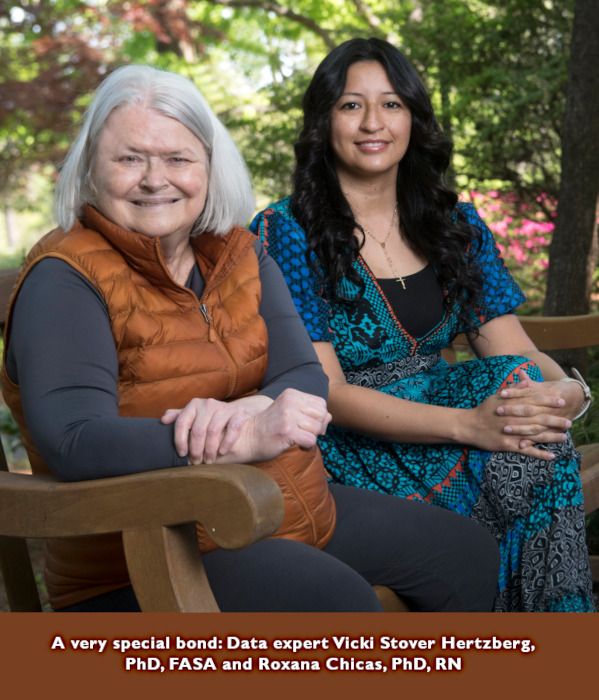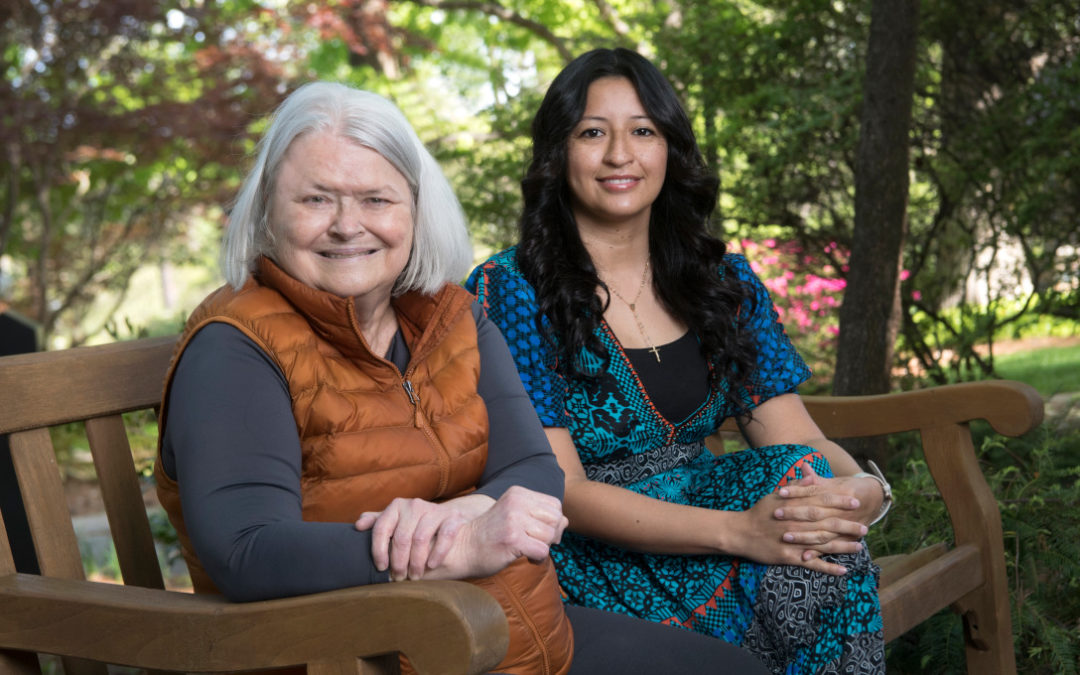Roxana Chicas, PhD, RN, a research professor in Emory’s Nell Hodgson Woodruff School of Nursing, rued her nontraditional academic path until a mentor reassured her: “The teacher always arrives when the student is ready.”
That advice about timing resonated last month as she prepared to donate a kidney to her mentor, professor and faculty colleague. Professor and biostatistician Vicki Stover Hertzberg, PhD, who directs the school’s Center for Data Science, had been waiting nine months for a transplant after being diagnosed with kidney failure.
The two professors’ personal relationship is only one aspect of their remarkable story. 
Both long ago had personal experiences that made them aware of the high need for living kidney transplants and the safety of donation. At the nationally No. 2-ranked School of Nursing, both women work on a research team that studies renal issues and other health problems related to heat exposure in farmworkers and published their findings in March. Both say their life-giving partnership reflects their school’s caring connections.
Chicas was only one of several Emory employees who answered Hertzberg’s call for potential donors in mid-2021. While others matched enough to donate, Chicas was the closest match.
“So much science has gone into it for such a long time, and to be able to use that science to help Dr. Hertzberg be healthier and live longer, it’s awesome. And I get to be a part of it.”
—Roxana Chicas, PhD, RN
“I have no words to express my gratitude for the individuals who came forward including those who ultimately, for one reason or another, could not be a donor,” Hertzberg said before the March 15 transplant surgery. “And for Roxana to do this is just phenomenal. I find it very overwhelming and very humbling.”
Most of us only need one kidney
Chicas’ first job at a pediatric office in Atlanta, when she was 18, exposed her to kidney issues and solutions. She translated for pediatric nephrologist Stephanie M. Jernigan, an associate professor of pediatrics at Emory School of Medicine.
“Children who were born with just one kidney often lived perfectly normal lives,” she says. “Other children who had kidney transplants did very well, even though it’s a very invasive surgery.”
She also learned to see her own intellectual potential.
Having come from El Salvador at age four and undocumented, Chicas had received temporary protective status that allowed her to work for the pediatricians. She helped them communicate with families who only spoke Spanish, and thought she might be smart enough to become a medical assistant so she could help them more. Pediatrician A. Gerald Reisman, MD, urged her to try nursing instead, and at age 28, Chicas enrolled in what is now Perimeter College at Georgia State University.
That educational decision led to Bridges to the Baccalaureate, an Emory program that nurtures minority students in research. With School of Nursing Dean Linda A. McCauley, PhD, RN, FAAN, as her advisor, Chicas got a BSN and went directly into the doctoral program. She joined McCauley’s team working on farmworker health, which felt personal because her mother, Maria Chicas, farmed in El Salvador. Farmworkers are 35 times more likely to die from heat-related illnesses than any other profession, she says.
“My goal is to do great science that will really improve the working conditions of agricultural workers,” Chicas says. “They are the backbone of this country and the globe. They feed us, and I think we need to value them more and recognize their worth, and they should be treated with dignity and given the same benefits that sometimes we take for granted. Many of them are undocumented and live in poverty, and I hope that I can be a part of a movement to better their lives.”
Heat-related illnesses affect kidney function, and Chicas did a postdoctoral stint in renal (kidney-related) medicine at the Emory School of Medicine. The research team measures indicators of health like core body temperature and kidney function.
“I got lucky, because I could have been working out in the field,” Chicas says. “I’m not there because of sacrifices that my mom made, and many other Latino parents have made and by having a mentor who told me that I can be a professional.”
A mentor in need
Hertzberg became Chicas’ professor and research teammate. From Florida to Mexico to Brazil, Chicas was in direct contact with farmworkers while Hertzberg worked to tell the story of the collected data.
“A wonderful mentor,” Chicas, 39, calls Hertzberg, 67. “She taught me that you can be smart and be strong in your career, and yet still be very kind.”
As the director for the nursing school’s Center for Data Science, Hertzberg is an internationally-recognized expert on “big data” and its impact on health care. She is widely known for her work measuring the social contacts in emergency departments and disease transmission on airplanes.
“Mentoring is what graduate education is all about,” Hertzberg says. “You learn a lot from each other. Part of it is just kind of a natural process because we’re engaged through research activities and part of that is just kind of understanding how the world works and what makes people tick. Roxana is incredibly driven and intrinsically kind, and always keeps me and our team focused on issues that our partner community experiences in ways that we don’t.”
On the farmworker longitudinal study, newer data relates to 25 markers of kidney function disease because of a relatively recent phenomenon called chronic kidney disease of undetermined etiology (CKDu). “Young farmworkers who had been feeling fine or really healthy all of a sudden wake up sick,” Hertzberg says. “Lo and behold, they have kidney failure and need dialysis.”
In late 2020, Hertzberg’s own bloodwork showed acute kidney injury, and when restrictive diet didn’t improve function enough, she was referred for a kidney transplant in mid-2021.
Like Chicas, Hertzberg had learned about the disease long before through a family friend and others. She reached out to her network by email and social media.
“Ideally a living donor is best,” she wrote. “A kidney from a living donor lasts on average 25 years, while a kidney for somebody who is about to have life support turned off is on average 12 years. Obviously, the 25 years is my preference…. the wait for a kidney from the person on life support will take three to seven years.”
She didn’t expect much response.
“I’m going to match”
Chicas jumped on Hertzberg’s direction for potential donors to phone the Emory Transplant Center (855-366-7989) or complete a questionnaire online.
“I knew it’s a pretty big surgery, but I was just like, ‘I have an extra kidney. I’m pretty healthy,’” she says. “And I called my mom and asked her what she thought and she was like, well, if that’s what you feel that you’re called to do, then go for it. And I was like, Okay.”
When she found out that there was competition to give a kidney to Hertzberg, Chicas told herself, “If God wants me to be the donor, then I’m going to match. So much science has gone into it for such a long time, and to be able to use that science to help Dr. Hertzberg be healthier and live longer, it’s awesome. And I get to be a part of it.”
Hertzberg even had colleagues clamoring to organize her meal train. This loyalty is partly from working at Emory since 1995, and supporting so many people and projects with her expertise. She served on dissertation committees for Chicas in 2020 and (at the University of Cincinnati) for McCauley in 1988.
Christian Larsen, MD, DPhil, professor of surgery in the Division of Transplantation at Emory and former dean of the Emory School of Medicine, transplanted Hertzberg’s new kidney last month. Larsen and Hertzberg knew each other through their collaborative research. From 2005 to 2010, they teamed-up on a protective immunity project studying aspects of the immune system in kidney transplant patients.
“This is not a road I would have chosen for myself,” Hertzberg says. “So I’m trying my hardest to learn the lessons along the way and to keep being positive. I want to dance at my grandchildren’s weddings, and the oldest one is soon to be five years old.”
Chicas believes that her success, her mentors and her organ donation have proved her favorite quote.
“Mother Teresa said, ‘If you can’t feed 100 people, then feed just one,’” she says. “I’m not a philanthropy. I’m not a billionaire. But I feel like there are certain things that I can do.”



